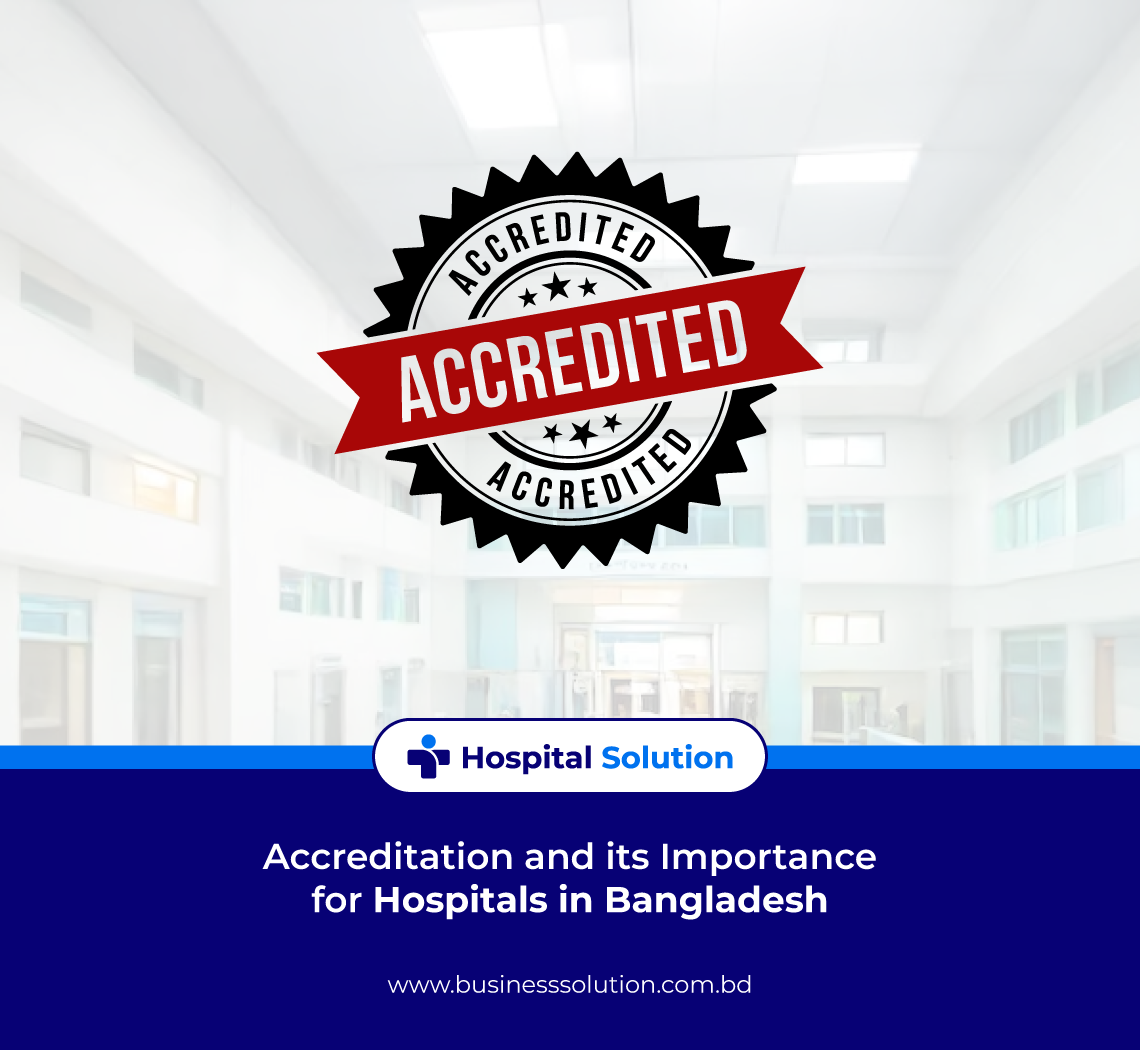
Introduction
Hospital accreditation is a formal recognition of a hospital's commitment to meeting established quality standards. In Bangladesh, with healthcare infrastructure evolving rapidly, accreditation has become essential for ensuring high-quality care, patient safety, and operational efficiency. Accreditation provides a competitive edge and fosters trust among patients. Business Solution provides hospital consultancy services to help healthcare institutions achieve these standards efficiently.
What is Hospital Accreditation?
Accreditation is a process where an independent body evaluates hospitals to ensure they meet specific criteria in patient care, safety, and operational effectiveness. International and local accrediting bodies, like the Joint Commission International (JCI), offer frameworks for hospitals to follow, ensuring they provide the highest quality of care.
Types of Accreditation
- National Accreditation: In Bangladesh, the Health Accreditation Council (HAC) plays a crucial role in certifying hospitals.
- International Accreditation: JCI, ISO certifications, and others offer global recognition to hospitals aiming for international standards.
Why is Accreditation Important for Hospitals?
1. Ensures Patient Safety
Accreditation enforces strict patient safety protocols, reducing medical errors and improving overall treatment outcomes. It ensures that hospitals follow standardized procedures in emergency care, surgery, and medication management.
2. Improves Quality of Care
Accredited hospitals adhere to evidence-based practices, ensuring patients receive effective and timely care. This improves treatment success rates, reduces complications, and enhances overall patient satisfaction.
3. Boosts Patient Trust and Confidence
Patients feel more confident about receiving care from an accredited hospital, as they know that the facility has been thoroughly evaluated. It assures them that the hospital follows best practices, has modern equipment, and employs trained professionals.
4. Enhances Operational Efficiency
Accreditation promotes the efficient use of resources, reducing operational costs and wastage. Streamlined processes and protocols help hospitals manage staff, equipment, and patients more effectively, leading to better service delivery.
5. Attracts Talented Healthcare Professionals
Accredited hospitals are more likely to attract highly skilled doctors, nurses, and other healthcare workers. Professionals prefer to work in institutions that uphold high standards of care, offer better working conditions, and provide opportunities for career growth.
6. Access to Government and International Funding
Accreditation often serves as a criterion for eligibility for government grants and international funding. Accredited hospitals are seen as safer investments by both public and private entities, making it easier to secure financial support for infrastructure development or research initiatives.
7. Increases Competitive Advantage
In a competitive healthcare market like Bangladesh, accreditation gives hospitals a significant edge. Patients, especially those seeking premium services, prefer accredited institutions, thus increasing patient inflow and revenues.
Accreditation in the Context of Bangladesh
The healthcare system in Bangladesh is growing, with both public and private hospitals striving to meet rising patient expectations. Accreditation helps bridge the gap between quality expectations and healthcare delivery by creating benchmarks for excellence.
Challenges Faced by Hospitals in Bangladesh
- Lack of Awareness: Many hospital administrators are still unaware of the benefits of accreditation.
- Financial Constraints: Smaller hospitals may find it difficult to bear the cost of the accreditation process.
- Resistance to Change: Hospitals may resist implementing new standards due to a lack of resources or reluctance from staff.
Benefits for Hospitals in Bangladesh
Accreditation opens new doors for Bangladeshi hospitals by improving service quality and patient care. It allows hospitals to align with international standards, improving their reputation and making them more competitive both locally and internationally.
The Role of Business Solution in Hospital Accreditation
At Business Solution, we assist hospitals in navigating the accreditation process. Our consultancy services cover areas such as:
- Market & Financial Feasibility: Helping hospitals assess their financial readiness for accreditation.
- Medical Equipment Planning: Ensuring the hospital is equipped with the right tools and technology for high-quality patient care.
- Hospital Information System: Implementing a robust system to manage patient data and hospital operations efficiently.
- Profit Maximization: Assisting hospitals in optimizing their operations for better financial returns post-accreditation.
- Business Modeling & Development: Offering strategic solutions to enhance a hospital’s operational structure in line with accreditation requirements.
Steps to Achieve Accreditation
- Initial Assessment: Evaluate the current state of the hospital to identify gaps in standards.
- Preparation and Training: Train staff on new protocols, safety standards, and operational procedures.
- Implementation: Introduce changes and upgrades, ensuring the hospital meets required benchmarks.
- Continuous Monitoring: Regularly review and update procedures to maintain accreditation status.
Conclusion
Accreditation is not just a certification—it's a commitment to maintaining the highest quality of patient care. In Bangladesh, hospitals that achieve accreditation benefit from improved trust, operational efficiency, and competitiveness. Business Solution is dedicated to helping healthcare institutions navigate this process, offering expert consultancy to ensure they meet the rigorous standards required for both national and international accreditation.





